- Home
- Ann M. Martin
Abby's Lucky Thirteen
Abby's Lucky Thirteen Read online
Special thanks to
Robin Dorman, Julie Komorn,
David Levithan, and Helen Perelman
for sharing their
Bar and Bat Mitzvah stories.
Contents
Title Page
Dedication
Chapter One
Chapter Two
Chapter Three
Chapter Four
Chapter Five
Chapter Six
Chapter Seven
Chapter Eight
Chapter Nine
Chapter Ten
Chapter Eleven
Chapter Twelve
Chapter Thirteen
Chapter Fourteen
Letter from Ann M. Martin
Acknowledgment
About the Author
Scrapbook
Also Available
Copyright
“Abby? Abby!”
I looked up from where I was sitting on the sidelines of the soccer field and grinned and waved. My twin sister, Anna, and her violin were standing there.
Well, okay, the violin wasn’t standing there. My sister was holding it in its case under one arm, while she waved to me with the other.
I finished lacing up my sneaks, jammed my cleats in my pack, and stood up to join her.
Although my sister and I are twins, we are identical only in appearance. We both have deep brown eyes that are almost black; we both wear glasses or contacts (depending on our moods); we both have dark brown, thick, curly hair, and pointed chins. But Anna wears her hair shorter than mine, with bangs. And although she is coordinated, she isn’t athletic. Her talent is music, and while I like to listen to music, I couldn’t carry a tune in a bucket.
Anna is first chair in the Stoneybrook Middle School orchestra, which means she is really, really good on the violin. She also plays the piano and she’s been known to do a few turns on our father’s old harmonica. In fact, I bet Anna could play any instrument on earth after only a couple of tries.
Also, Anna doesn’t have asthma and allergies. Life makes me sneeze. Kitty litter, dogs, dust, feather pillows, down comforters, down coats, tomatoes, shellfish, milk, and cheese all give me fits. But although I’ve had a couple of serious asthma attacks (which got zapped by a quick trip to the emergency room), there’s no way I’m gonna let that slow me down.
I don’t play the violin or the piano or the harmonica. I do my best playing with my feet. Soccer is my game, but I also like running, skiing, basketball, and softball. I love sports. Back on Long Island, where we used to live, I was the star forward, leading scorer, and co-captain of the soccer team.
I’m not bragging. In my opinion, the only people who brag are the ones who aren’t first chair, if you know what I mean.
“How was band practice?” I asked Anna as I jogged up to her. I waved good-bye to my teammates on the SMS soccer team and fell into step beside my sister.
“It’s the orchestra, not the band, and you know it,” said Anna, smiling at me.
“Sorry. I didn’t mean to do violins to your feelings,” I replied, making an awful pun on the word violence.
My sister groaned.
“Sorry. That was viol,” I couldn’t resist adding.
I like puns, the worse the better. My sister tolerates them. Another difference between us.
“If you make another vile pun, Abby, you’re in trouble.”
“Oh, fiddle,” I wisecracked and ducked as Anna took a swat at me. But she was grinning.
“Practice was fine,” she said. “What about yours?”
“Excellent,” I said. “I love April. Perfect soccer weather. Too bad we have to go to Bat Mitzvah class. I wish …”
Wait, wait, wait. I’m doing what I always do. Going at top speed. And leaving you behind, right?
Here’s the deal.
I’m Abby Stevenson. I’m thirteen years old and I live in Stoneybrook, Connecticut, with my only sibling, Anna, and our mother, Rachel. We moved here from Long Island not too long ago, after our mother got this great promotion at her publishing house in New York City. The promotion allowed my mother to buy a bigger house, and since she felt the family needed a change, we moved to Stoneybrook.
Neither Anna nor I was delighted with the Big Move. Although we didn’t talk about it, I know we both felt that there had been enough changes in the past few years. We didn’t want to leave the house where our father had lived with us, either. He was killed in a car crash when we were nine.
That was the worst time in my life. The driver of the truck who hit our father’s car only broke his arm, but our father was killed instantly. For a long time, my mother wouldn’t even mention his name. For a long time, I forgot how to laugh and I couldn’t make jokes.
For a long time … no, I don’t want to talk about it anymore.
Anyway, we complained, we resisted, and then what did we do? We moved, of course. My mother liked her new job. My twin sister joined the band — excuse me, the orchestra — at school and started making some friends. We were both invited to join this club called the Baby-sitters Club (also known as the BSC, more about that later). Anna decided to stick to her music.
I joined the club.
The members of the club became my friends, and provided not only friendship but some pretty wild adventures and baby-sitting jobs that brought in very welcome extra money. I also joined the soccer team, participated in class, and avoided any major asthma attacks, except for one that sent me to the emergency room and almost canceled my membership in the BSC (but that’s another story).
In short, I adjusted. We all did. I started liking Stoneybrook for real.
And then the Bat Mitzvah (pronounced Baht Mitz-vah) business creeps up and bites me on the ankle.
Okay, okay, a Bat Mitzvah can’t bite you on the ankle. Becoming a Bat Mitzvah is very special. It is the day when a Jewish girl celebrates her entry into adulthood, usually shortly after she turns thirteen. It is an extremely important, wonderful celebration (Jewish boys have a Bar Mitzvah).
But becoming a Bat Mitzvah involves a ton of work. At least one year in advance you have to start taking lessons to prepare you for the Shabbat when you become a Bat Mitzvah. (Shabbat is the holy day of the week for Jewish people, from Friday at sundown to Saturday at sundown.) To become a Bat Mitzvah, you have to read a portion of the Torah, which is the first five books of the Bible written in Hebrew. The Torah contains stories, laws, and history of the Jewish people.
Hebrew. This is a language I am studying (not very well) to become a Bat Mitzvah. That is one of the reasons it takes so much work to become a Bat Mitzvah. I have to sing (yikes!) another part of the service, the Haftarah, a reading after the Torah.
So you read (actually you chant more than sing, in Hebrew). And then in my synagogue, you also have to give a speech (which the rabbi keeps calling a sermon, which makes me even more nervous). And then there is usually a party. All your relatives come and give you gifts and big hugs and kisses and tell embarrassing stories about when you were a little girl.
At least, that’s what will happen at our Bat Mitzvah, if I know some of our relatives. And practically all of our relatives, it seems, were attending the big event. Mom, who once took classes at the Culinary Institute of America (she calls it the CIA — Anna and I used to tell other kids that our mother worked at the CIA), was planning a huge Friday night dinner to celebrate.
We had even sent out printed invitations — heavy, purple paper; thick, curly white lettering; the whole bit. And we were going to go shopping for special dresses to wear. Our Bat Mitzvah was going to be big. Huge. Wedding-sized, practically.
All that work, and all those details, can sneak up on you, no matter how fast you move. So as much as I was looking forward to
it, I was also beginning to worry, really worry, about my part of the Bat Mitzvah.
For one thing, I wasn’t keeping up with everything as well as Anna was. And for another, maybe, just maybe, I had let spring fever lead me into playing soccer and taking baby-sitting jobs when I should have been doing schoolwork and practicing my Hebrew.
Anna, on the other hand, had managed to keep up with her two hours of violin practice every day, plus belong to the orchestra, plus do her schoolwork, and shine in Bat Mitzvah lessons.
We turned up the sidewalk to our synagogue.
Anna sighed.
I frowned. “Something wrong?”
“No,” replied Anna. She sighed again.
“You’re sighing. Something’s wrong.”
“Well …” Anna said. “I guess there is. I keep thinking about the speech.”
The way she said it, I knew that both words were in capital letters in her mind: THE SPEECH.
Anna continued, “Every time I think about standing up in front of everybody, all our friends and relatives, everyone at the Shabbat service, I feel, well, sick.”
This truly amazed me. “Anna,” I said, “You’ve played a solo with the high school orchestra on Long Island! You’ve stood up in front of judges and won violin competitions! How can making a speech scare you?”
“I don’t know, but it does.” Anna wrapped her arms around her violin case and hugged it to her chest, almost as if it were armor. “It’s different when I play the violin. I forget where I am. I even forget who I am. I don’t think about anything. I just play.”
I considered that for a moment. Times like that occurred in sports, too. Suddenly, running wasn’t hard, it was easy. You floated above the ground. And then, just as suddenly, the race was over, or the game finished, and you looked up in surprise. At that moment, your feet came down on the ground again, hard.
I remembered, too, the dazed expression on my sister’s face when she finished a performance and the audience began to applaud. She always looked a little startled. I realized now that it was because she had forgotten other people were even in the room with her.
She’d come down to earth, too. Hard. And it was only then she saw the audience.
“You’ll do fine,” I reassured her. “After you say the first few words, everything will fall into place, just like a violin piece. And you’ve got a good speech.”
Actually, we’d worked on our speeches together. Anna was going to talk about some of the changes that we’d been through, and becoming a Bat Mitzvah. I was going to talk about the travels ahead and becoming an adult.
Anna nodded. But she didn’t stop clutching her violin case as we walked through the doors into the synagogue.
Rabbi Dorman was waiting for us. He seemed glad to see us and didn’t seem to notice that we both, for separate reasons, looked less than happy to be there.
“Come on in,” he said, waving us to the table on one side of his office.
The office, I decided, was a lot like Rabbi Dorman himself. It was friendly and interesting and full of unexpected surprises. The rabbi liked plants and both windows in his office were full of them. The light that came in filtered through a jungle of hanging spider plants and ivy, fat cacti, and jade plants. Some of the plants looked as if they were on their last leaf, but it wasn’t because Rabbi Dorman didn’t have a green thumb — it was because he couldn’t help “rescuing” plants he saw dwindling away in grocery stores and shops.
Another thing I liked about the rabbi was that the first thing he did, before he began our lessons, was give us this cool book to read called Turning Thirteen. It was about a girl who is afraid she’ll lose her best friend unless they prepare for their Bat Mitzvahs together. The rabbi had used that book to talk about the reasons people have a Bar or Bat Mitzvah and what becoming a Bar or Bat Mitzvah means.
I’d never really thought about it before. In my mind, it was this big party that was somewhere in the future. Gifts were involved. Lots of gifts. That was about it.
Bat Mitzvah is Hebrew for “daughter of the commandment.” When I became a daughter of the commandment, I would become a part of the adult Jewish community, not just my synagogue, but the whole Jewish community all over the world, from Australia to Africa to Alaska.
“The celebration of becoming a Bar Mitzvah or a Bat Mitzvah is a tradition rooted in the commandment to study Torah,” the rabbi was saying now. “Bar Mitzvah, the celebration for a Jewish boy coming of age, has been around since the Middle Ages, but Bat Mitzvahs have been celebrated only in this century.”
I remembered when my mom announced on our twelfth birthday that it was time to start preparing for our Bat Mitzvah. Then she showed us pictures of her own service and the next thing we knew, we were taking lessons with Rabbi Dorman.
“How is the Torah portion coming along?” Rabbi Dorman asked us.
“Great,” said Anna.
I began to calculate how much more work I had to do.
Calculate. An unfortunate choice of words. Calculate was exactly what I wasn’t doing well these days.
Although a great soccer practice had helped put it out of my mind, the memory of the math quiz I’d gotten back earlier in the day, with a big red “F” across the top, returned in full force.
My teacher said my mother had to sign it, to prove she’d seen it. Honestly, I thought indignantly. It’s not as if I wasn’t going to tell Mom about it. It’s just that I wasn’t going to tell her about it right away. I wanted to wait until the time was right.
Like when I was twenty-one.
“And you, Abby?” asked Rabbi Dorman.
“Huh? Oh. Great,” I said.
Rabbi Dorman smiled. “You’ve still got time yet. Don’t worry. Now, let’s get to work.”
We got to work. But I had trouble concentrating, even though we were studying the history of the Hebrew bible, which was very interesting. I had too much to think about.
* * *
“What were you thinking of?” demanded my mom.
Post-dinner test-signing time. Not the perfect time to ask my mom to sign off on a flunked math test, but I figured it was better than waking up at dawn when she was drinking her coffee alone in the kitchen.
“It wasn’t totally my fault,” I answered quickly. “I’d been out for two days before that, remember? With a cold.” I pointed to the date at the top of the test.
“Did you tell your teacher? What’s her name? Ms. Frost?”
“Yeah. But she said, ‘tough,’ and made me take it anyway.” I tried to look righteously indignant and pathetically victimized.
My mother’s brown eyes narrowed. “That’s not right! Did you show her the note I wrote to your homeroom teacher?”
“Ms. Frost didn’t care,” I said. (She hadn’t. That was true.)
“You tell Ms. Frost,” said my mother, folding up the test and sticking it into her briefcase, “that I’ll give her the signed test back tomorrow in person. I have a few things I’d like to say to her.”
Uh-oh.
“Mom! That’s okay. I mean, it’s just one test. I’ll make it up.”
“Abby, I’m not about to let a teacher treat one of my daughters this way. In fact, I very much hope I wouldn’t let a teacher treat any child this way. Injustice is injustice.”
“But …”
Mom suddenly smiled. “I won’t embarrass you, Abby, I promise.”
What else could I say? I gulped, and nodded, and left.
I’d told my mother the truth — and I didn’t think what Ms. Frost had done was fair. But I also knew that I’d spent most of the second day I was home from school watching reruns on TV, including a Leave It to Beaver marathon. After that, I’d studied the translation of the Haftarah, and finished reading a book on the Shabbat service that the rabbi had given us. I could have kept up with my math homework instead of watching Wally and the Beav. But I hadn’t. I’d been counting on Ms. Frost’s being sympathetic.
She hadn’t been. And when I said that I was afra
id that looking at all those numbers would cause me to have a severe relapse, she hadn’t even cracked a smile.
“Abby. You haven’t been giving math your full attention for some time now. I don’t see that two days out with a cold makes that much difference,” Ms. Frost had said, folding her arms.
I folded mine.
We looked at each other. I gave up and took the test and flunked.
So there was some nastiness on both sides in this situation.
Things went from not nice to worse the next afternoon. I spent the whole day dreading my mother’s visit to school. The expression on Ms. Frost’s face when I told her my mother was bringing the test in personally didn’t help.
Ms. Frost knew she was being set up. And even though she deserved it, sort of, I felt bad.
The last bell rang and I leaped from my seat. Maybe my mom hadn’t been able to get off early. Maybe her train had been delayed. Maybe she’d reconsidered and decided to mail the signed test back to my teacher.
I dashed into the hall and headed for my locker, vowing to do my math homework first that night, even before the Bat Mitzvah homework.
I stopped as I saw my mother push open the door of Ms. Frost’s room and step inside.
Slowly I started forward again. I didn’t mean to eavesdrop. I’m not sure what I meant to do. Somehow, though, I found myself standing outside the partially open door, listening to my mother talk to Ms. Frost.
“But Mrs. Stevenson,” I heard Ms. Frost say.
“I’m not finished,” snapped my mom. “I’d appreciate it if you would do me the courtesy of listening to what I have to say, a courtesy you apparently don’t extend to your students.”
Uh-oh!
“Now just a minute,” I heard Ms. Frost say indignantly.
But my mother was on a roll. Keeping her voice firm and calm and steely cold, she cross-examined Ms. Frost like a prosecuting attorney on a television show. By the time my mother was finished, Ms. Frost had admitted that she had refused to give me extra time for the test, even though she knew I had been out sick. Ms. Frost didn’t even have the chance to work in the information that I wasn’t the best student and maybe hadn’t earned any kind of special treatment — and that maybe, just maybe, I should have been able to do my math homework and stay caught up on my own.

 Karen's Tea Party
Karen's Tea Party Kristy and the Snobs
Kristy and the Snobs Best Kept Secret
Best Kept Secret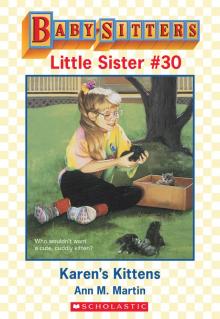 Karen's Kittens
Karen's Kittens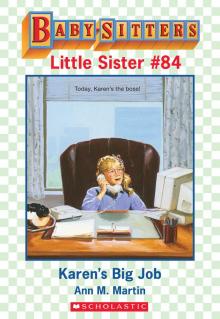 Karen's Big Job
Karen's Big Job Claudia and the Genius of Elm Street
Claudia and the Genius of Elm Street The Fire at Mary Anne's House
The Fire at Mary Anne's House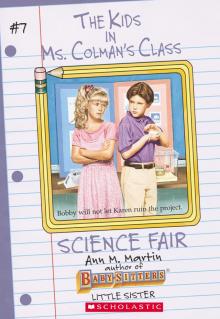 Science Fair
Science Fair Me and Katie (The Pest)
Me and Katie (The Pest)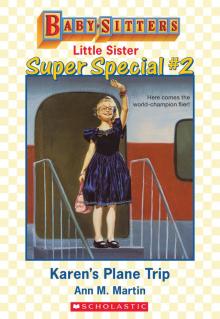 Karen's Plane Trip
Karen's Plane Trip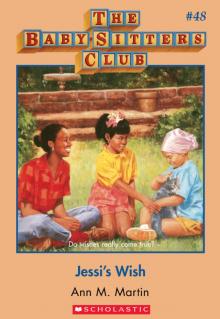 Jessi's Wish
Jessi's Wish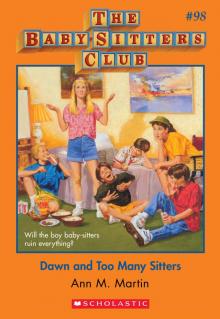 Dawn and Too Many Sitters
Dawn and Too Many Sitters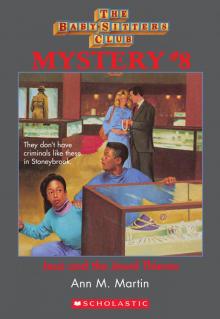 Jessi and the Jewel Thieves
Jessi and the Jewel Thieves Eleven Kids, One Summer
Eleven Kids, One Summer Karen's Goldfish
Karen's Goldfish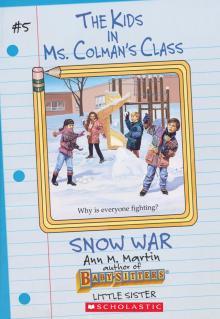 Snow War
Snow War Abby and the Secret Society
Abby and the Secret Society Keeping Secrets
Keeping Secrets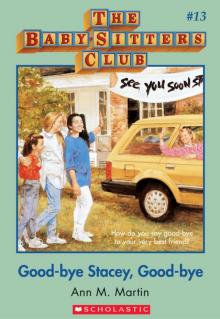 Good-Bye Stacey, Good-Bye
Good-Bye Stacey, Good-Bye Karen's Sleepover
Karen's Sleepover Claudia and the World's Cutest Baby
Claudia and the World's Cutest Baby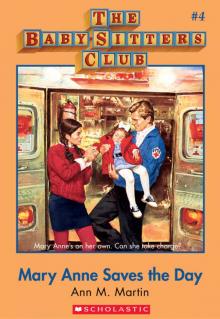 Mary Anne Saves the Day
Mary Anne Saves the Day Mallory and the Dream Horse
Mallory and the Dream Horse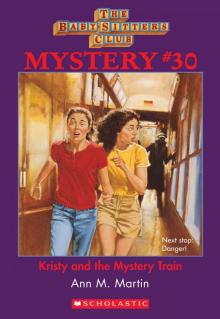 Kristy and the Mystery Train
Kristy and the Mystery Train Dawn's Family Feud
Dawn's Family Feud Karen's Twin
Karen's Twin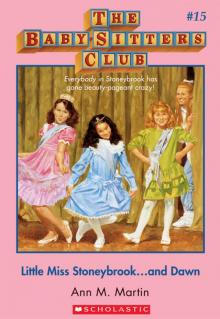 Little Miss Stoneybrook... And Dawn
Little Miss Stoneybrook... And Dawn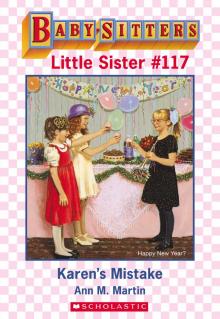 Karen's Mistake
Karen's Mistake Karen's Movie Star
Karen's Movie Star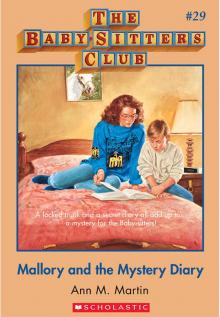 Mallory and the Mystery Diary
Mallory and the Mystery Diary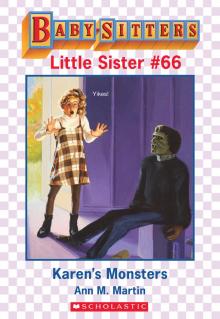 Karen's Monsters
Karen's Monsters Kristy + Bart = ?
Kristy + Bart = ?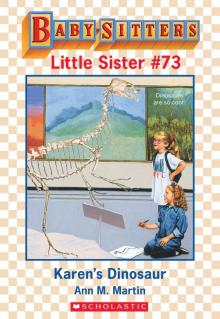 Karen's Dinosaur
Karen's Dinosaur Here Today
Here Today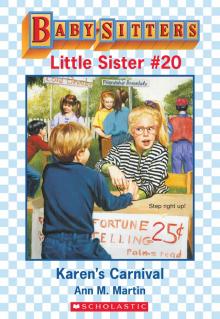 Karen's Carnival
Karen's Carnival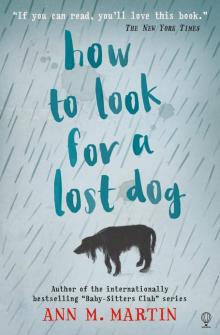 How to Look for a Lost Dog
How to Look for a Lost Dog Stacey vs. Claudia
Stacey vs. Claudia Stacey's Ex-Boyfriend
Stacey's Ex-Boyfriend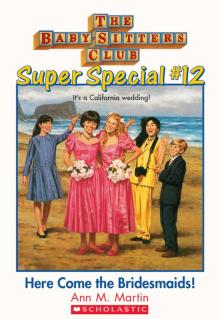 Here Come the Bridesmaids!
Here Come the Bridesmaids! Graduation Day
Graduation Day Kristy's Big News
Kristy's Big News Karen's School Surprise
Karen's School Surprise Kristy Thomas, Dog Trainer
Kristy Thomas, Dog Trainer Baby-Sitters' Christmas Chiller
Baby-Sitters' Christmas Chiller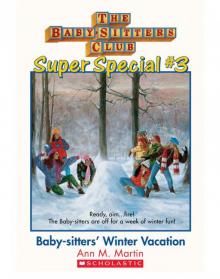 Baby-Sitters' Winter Vacation
Baby-Sitters' Winter Vacation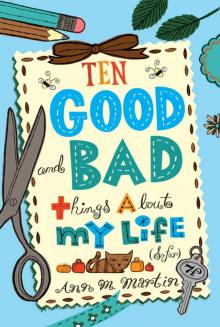 Ten Good and Bad Things About My Life
Ten Good and Bad Things About My Life Claudia and the Bad Joke
Claudia and the Bad Joke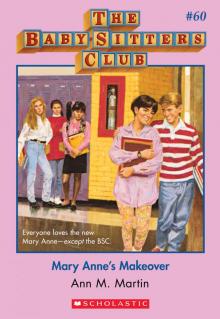 Mary Anne's Makeover
Mary Anne's Makeover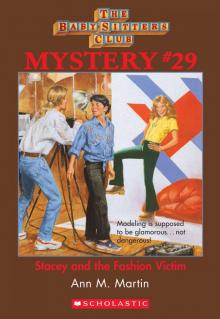 Stacey and the Fashion Victim
Stacey and the Fashion Victim Dawn Schafer, Undercover Baby-Sitter
Dawn Schafer, Undercover Baby-Sitter Karen's Tuba
Karen's Tuba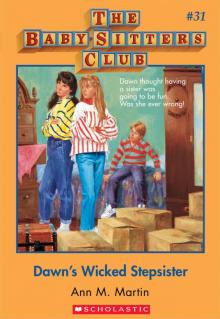 Dawn's Wicked Stepsister
Dawn's Wicked Stepsister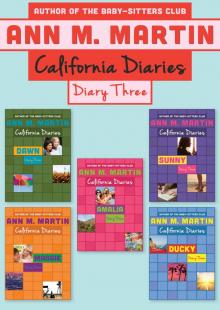 Diary Three: Dawn, Sunny, Maggie, Amalia, and Ducky
Diary Three: Dawn, Sunny, Maggie, Amalia, and Ducky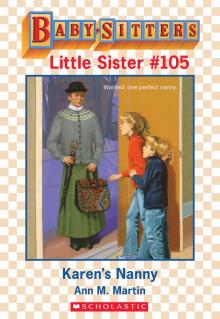 Karen's Nanny
Karen's Nanny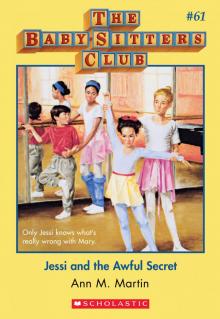 Jessi and the Awful Secret
Jessi and the Awful Secret Karen's New Year
Karen's New Year Karen's Candy
Karen's Candy Karen's President
Karen's President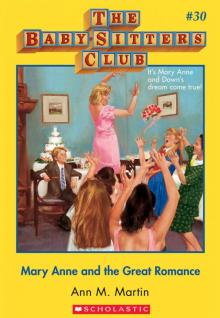 Mary Anne and the Great Romance
Mary Anne and the Great Romance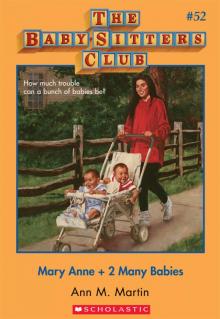 Mary Anne + 2 Many Babies
Mary Anne + 2 Many Babies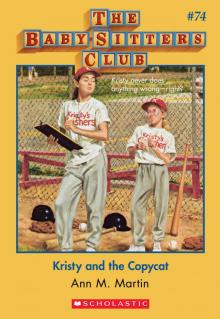 Kristy and the Copycat
Kristy and the Copycat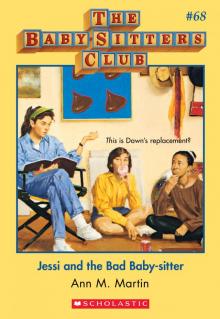 Jessi and the Bad Baby-Sitter
Jessi and the Bad Baby-Sitter Claudia, Queen of the Seventh Grade
Claudia, Queen of the Seventh Grade Claudia and the Lighthouse Ghost
Claudia and the Lighthouse Ghost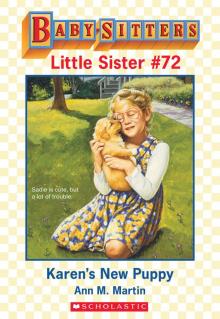 Karen's New Puppy
Karen's New Puppy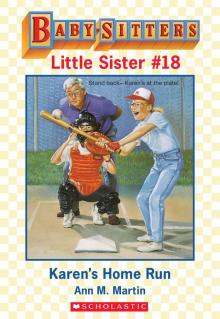 Karen's Home Run
Karen's Home Run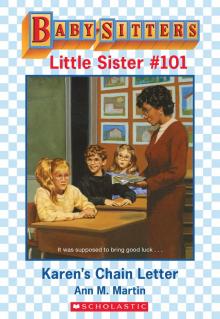 Karen's Chain Letter
Karen's Chain Letter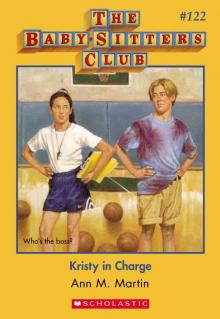 Kristy in Charge
Kristy in Charge Karen's Angel
Karen's Angel Mary Anne and Too Many Boys
Mary Anne and Too Many Boys Karen's Big Fight
Karen's Big Fight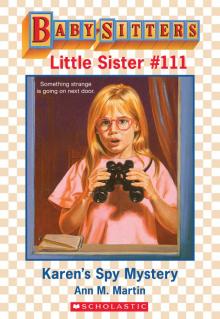 Karen's Spy Mystery
Karen's Spy Mystery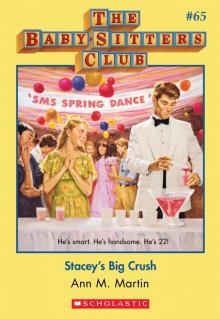 Stacey's Big Crush
Stacey's Big Crush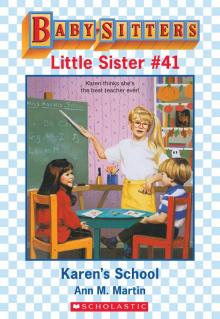 Karen's School
Karen's School Claudia and the Terrible Truth
Claudia and the Terrible Truth Karen's Cowboy
Karen's Cowboy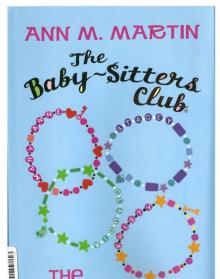 The Summer Before
The Summer Before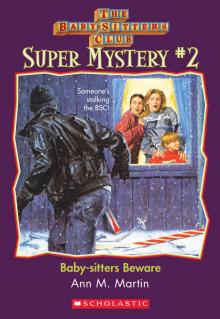 Beware, Dawn!
Beware, Dawn! Belle Teale
Belle Teale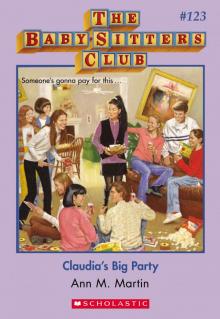 Claudia's Big Party
Claudia's Big Party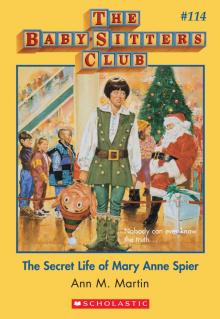 The Secret Life of Mary Anne Spier
The Secret Life of Mary Anne Spier Karen's Book
Karen's Book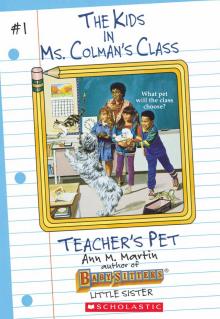 Teacher's Pet
Teacher's Pet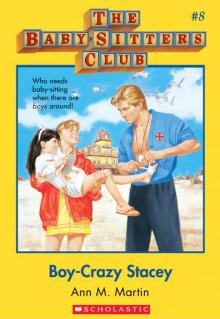 Boy-Crazy Stacey
Boy-Crazy Stacey Claudia and the Disaster Date
Claudia and the Disaster Date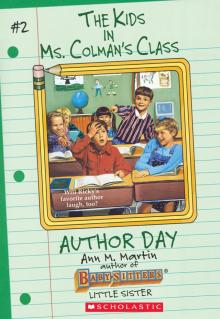 Author Day
Author Day Claudia and the Sad Good-Bye
Claudia and the Sad Good-Bye Kristy and the Worst Kid Ever
Kristy and the Worst Kid Ever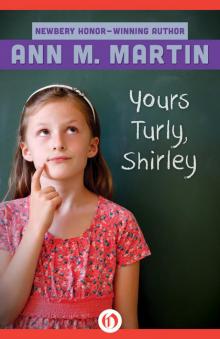 Yours Turly, Shirley
Yours Turly, Shirley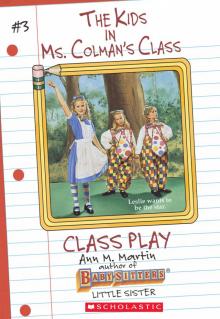 Class Play
Class Play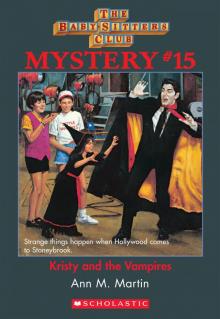 Kristy and the Vampires
Kristy and the Vampires Kristy and the Cat Burglar
Kristy and the Cat Burglar Karen's Pumpkin Patch
Karen's Pumpkin Patch Stacey and the Mystery at the Empty House
Stacey and the Mystery at the Empty House Karen's Chicken Pox
Karen's Chicken Pox Mary Anne and the Playground Fight
Mary Anne and the Playground Fight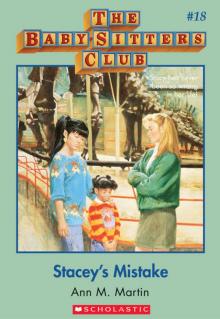 Stacey's Mistake
Stacey's Mistake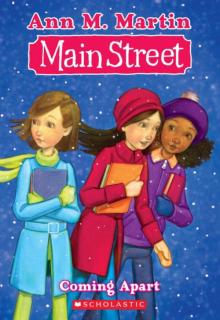 Coming Apart
Coming Apart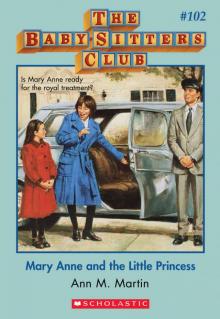 Mary Anne and the Little Princess
Mary Anne and the Little Princess Karen, Hannie and Nancy: The Three Musketeers
Karen, Hannie and Nancy: The Three Musketeers 'Tis the Season
'Tis the Season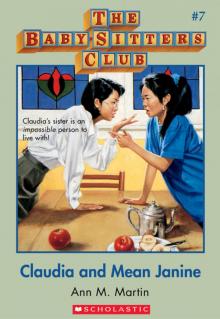 Claudia and Mean Janine
Claudia and Mean Janine Karen's School Bus
Karen's School Bus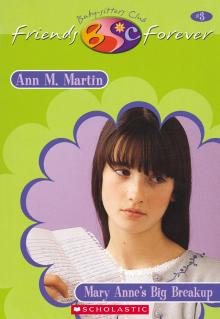 Mary Anne's Big Breakup
Mary Anne's Big Breakup Rain Reign
Rain Reign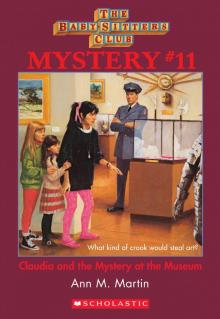 Claudia and the Mystery at the Museum
Claudia and the Mystery at the Museum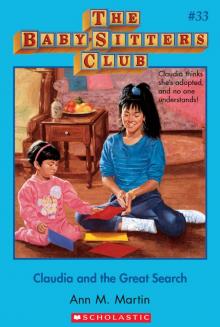 Claudia and the Great Search
Claudia and the Great Search Karen's Doll
Karen's Doll Shannon's Story
Shannon's Story Sea City, Here We Come!
Sea City, Here We Come!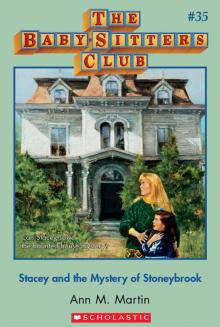 Stacey and the Mystery of Stoneybrook
Stacey and the Mystery of Stoneybrook Karen's Treasure
Karen's Treasure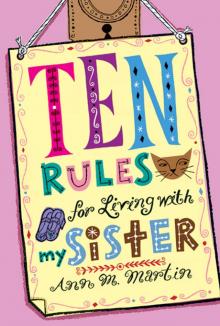 Ten Rules for Living With My Sister
Ten Rules for Living With My Sister With You and Without You
With You and Without You Baby-Sitters' Island Adventure
Baby-Sitters' Island Adventure Karen's Fishing Trip
Karen's Fishing Trip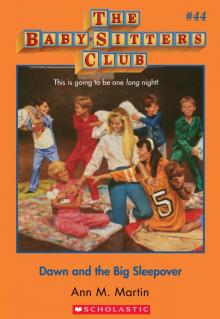 Dawn and the Big Sleepover
Dawn and the Big Sleepover New York, New York!
New York, New York! Ten Kids, No Pets
Ten Kids, No Pets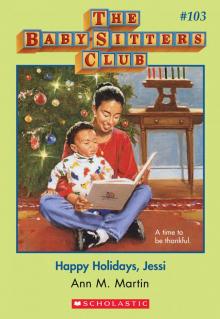 Happy Holidays, Jessi
Happy Holidays, Jessi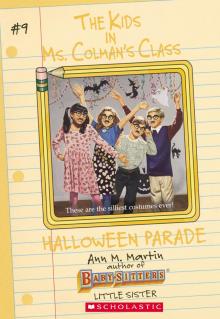 Halloween Parade
Halloween Parade Karen's New Holiday
Karen's New Holiday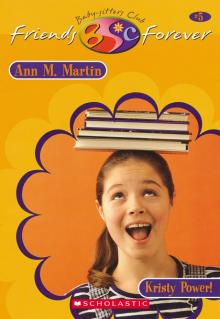 Kristy Power!
Kristy Power! Karen's Wish
Karen's Wish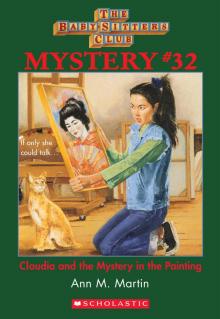 Claudia and the Mystery in the Painting
Claudia and the Mystery in the Painting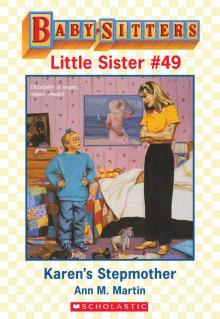 Karen's Stepmother
Karen's Stepmother Abby in Wonderland
Abby in Wonderland Karen's Snow Day
Karen's Snow Day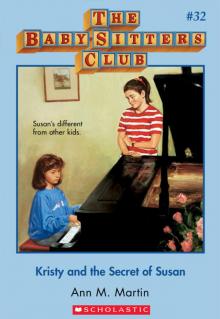 Kristy and the Secret of Susan
Kristy and the Secret of Susan Karen's Pony Camp
Karen's Pony Camp Karen's School Trip
Karen's School Trip Mary Anne to the Rescue
Mary Anne to the Rescue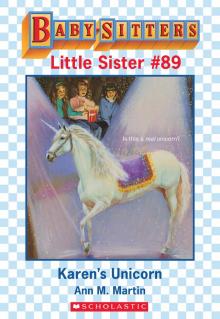 Karen's Unicorn
Karen's Unicorn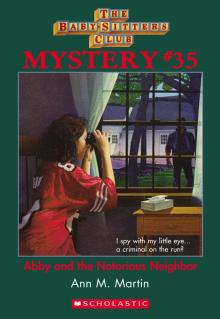 Abby and the Notorious Neighbor
Abby and the Notorious Neighbor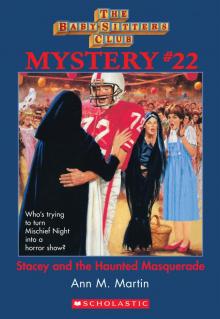 Stacey and the Haunted Masquerade
Stacey and the Haunted Masquerade Claudia Gets Her Guy
Claudia Gets Her Guy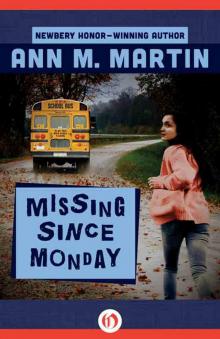 Missing Since Monday
Missing Since Monday Stacey's Choice
Stacey's Choice Stacey's Ex-Best Friend
Stacey's Ex-Best Friend Karen's New Teacher
Karen's New Teacher Karen's Accident
Karen's Accident Karen's Lucky Penny
Karen's Lucky Penny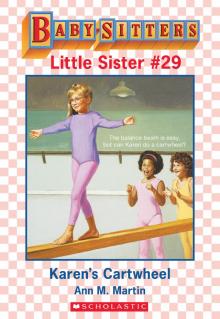 Karen's Cartwheel
Karen's Cartwheel Karen's Puppet Show
Karen's Puppet Show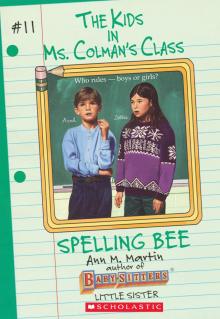 Spelling Bee
Spelling Bee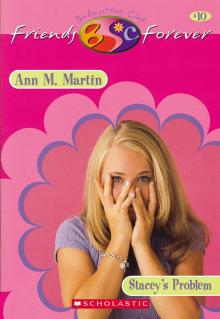 Stacey's Problem
Stacey's Problem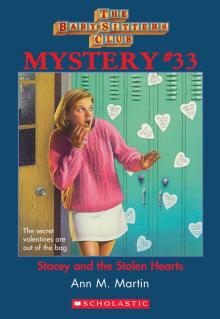 Stacey and the Stolen Hearts
Stacey and the Stolen Hearts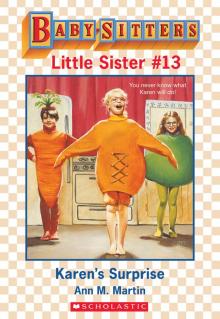 Karen's Surprise
Karen's Surprise Karen's Worst Day
Karen's Worst Day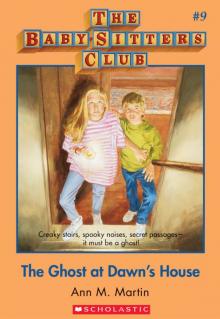 The Ghost at Dawn's House
The Ghost at Dawn's House Karen's Big Sister
Karen's Big Sister Karen's Easter Parade
Karen's Easter Parade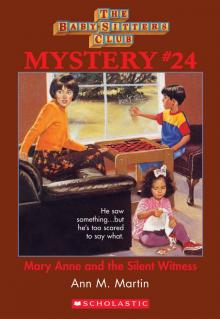 Mary Anne and the Silent Witness
Mary Anne and the Silent Witness Karen's Swim Meet
Karen's Swim Meet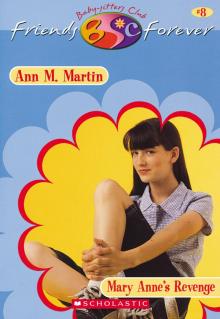 Mary Anne's Revenge
Mary Anne's Revenge Karen's Mystery
Karen's Mystery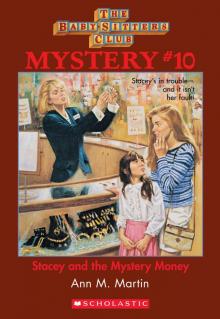 Stacey and the Mystery Money
Stacey and the Mystery Money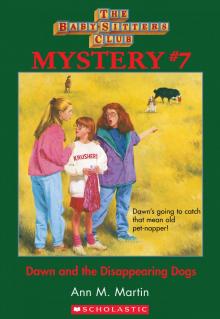 Dawn and the Disappearing Dogs
Dawn and the Disappearing Dogs Karen's Christmas Tree
Karen's Christmas Tree Welcome to Camden Falls
Welcome to Camden Falls Karen's Pilgrim
Karen's Pilgrim Dawn and the Halloween Mystery
Dawn and the Halloween Mystery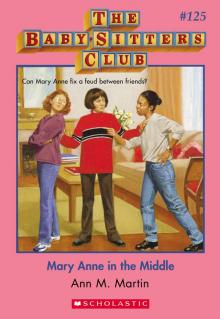 Mary Anne in the Middle
Mary Anne in the Middle Karen's Toys
Karen's Toys Kristy's Great Idea
Kristy's Great Idea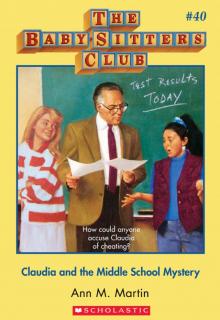 Claudia and the Middle School Mystery
Claudia and the Middle School Mystery Karen's Big Weekend
Karen's Big Weekend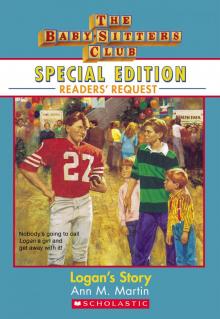 Logan's Story
Logan's Story Karen's Yo-Yo
Karen's Yo-Yo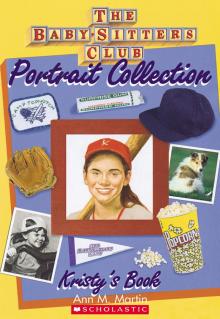 Kristy's Book
Kristy's Book Mallory and the Ghost Cat
Mallory and the Ghost Cat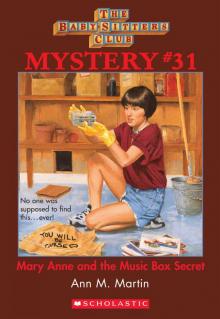 Mary Anne and the Music
Mary Anne and the Music Karen's Tattletale
Karen's Tattletale Karen's County Fair
Karen's County Fair Karen's Mermaid
Karen's Mermaid Snowbound
Snowbound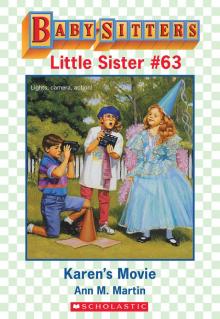 Karen's Movie
Karen's Movie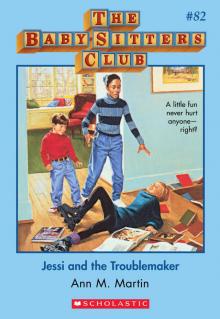 Jessi and the Troublemaker
Jessi and the Troublemaker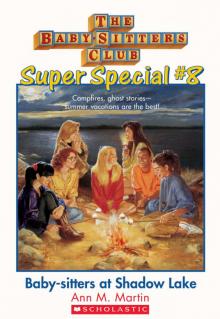 Baby-Sitters at Shadow Lake
Baby-Sitters at Shadow Lake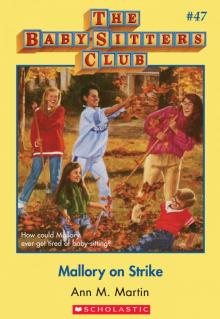 Mallory on Strike
Mallory on Strike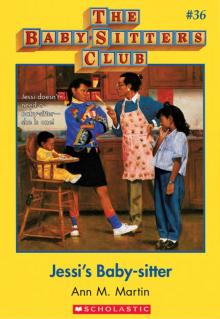 Jessi's Baby-Sitter
Jessi's Baby-Sitter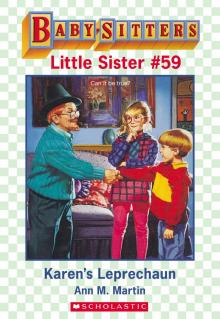 Karen's Leprechaun
Karen's Leprechaun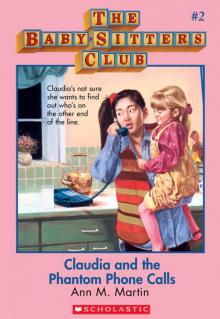 Claudia and the Phantom Phone Calls
Claudia and the Phantom Phone Calls Karen's Good-Bye
Karen's Good-Bye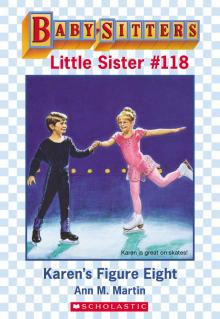 Karen's Figure Eight
Karen's Figure Eight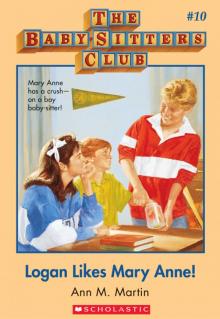 Logan Likes Mary Anne!
Logan Likes Mary Anne!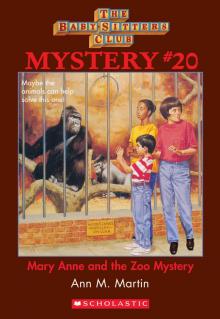 Mary Anne and the Zoo Mystery
Mary Anne and the Zoo Mystery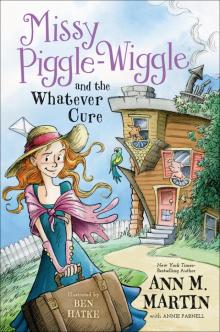 Missy Piggle-Wiggle and the Whatever Cure
Missy Piggle-Wiggle and the Whatever Cure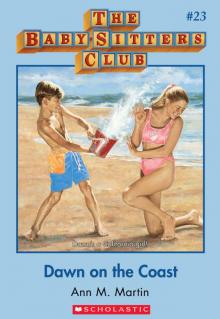 Dawn on the Coast
Dawn on the Coast Stacey and the Cheerleaders
Stacey and the Cheerleaders Claudia and the Clue in the Photograph
Claudia and the Clue in the Photograph Karen's New Friend
Karen's New Friend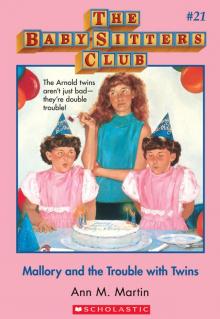 Mallory and the Trouble With Twins
Mallory and the Trouble With Twins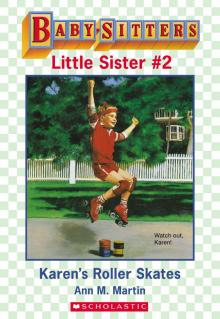 Karen's Roller Skates
Karen's Roller Skates Abby and the Best Kid Ever
Abby and the Best Kid Ever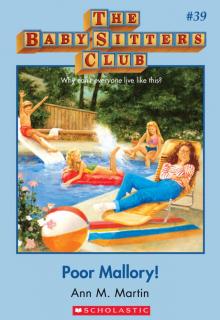 Poor Mallory!
Poor Mallory!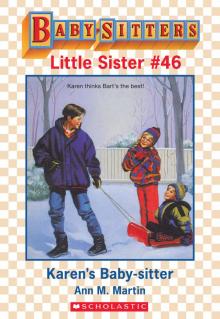 Karen's Witch
Karen's Witch Karen's Grandmothers
Karen's Grandmothers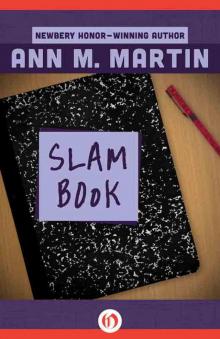 Slam Book
Slam Book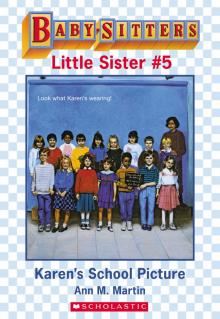 Karen's School Picture
Karen's School Picture Karen's Reindeer
Karen's Reindeer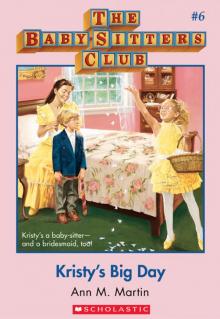 Kristy's Big Day
Kristy's Big Day The Long Way Home
The Long Way Home Karen's Sleigh Ride
Karen's Sleigh Ride On Christmas Eve
On Christmas Eve Karen's Copycat
Karen's Copycat Karen's Ice Skates
Karen's Ice Skates Claudia and the Little Liar
Claudia and the Little Liar Abby the Bad Sport
Abby the Bad Sport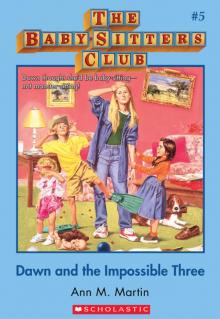 The Baby-Sitters Club #5: Dawn and the Impossible Three
The Baby-Sitters Club #5: Dawn and the Impossible Three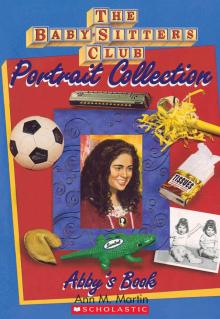 Abby's Book
Abby's Book Karen's Big Top
Karen's Big Top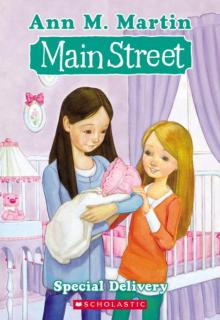 Main Street #8: Special Delivery
Main Street #8: Special Delivery Kristy and the Kidnapper
Kristy and the Kidnapper Karen's Ski Trip
Karen's Ski Trip Karen's Hurricane
Karen's Hurricane Stacey and the Mystery at the Mall
Stacey and the Mystery at the Mall Jessi and the Superbrat
Jessi and the Superbrat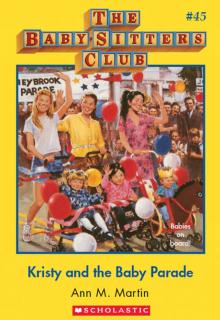 Kristy and the Baby Parade
Kristy and the Baby Parade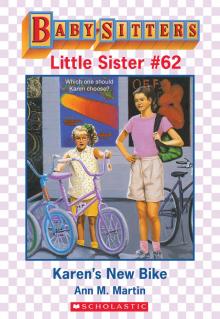 Karen's New Bike
Karen's New Bike Karen's Big City Mystery
Karen's Big City Mystery Baby-Sitters' European Vacation
Baby-Sitters' European Vacation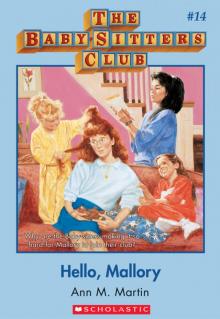 Hello, Mallory
Hello, Mallory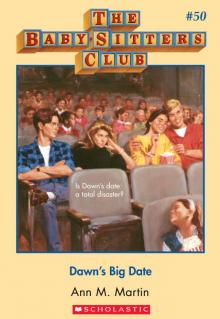 Dawn's Big Date
Dawn's Big Date Karen's Christmas Carol
Karen's Christmas Carol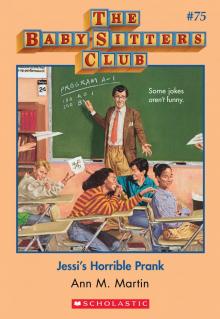 Jessi's Horrible Prank
Jessi's Horrible Prank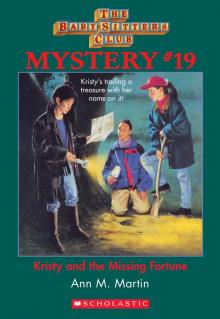 Kristy and the Missing Fortune
Kristy and the Missing Fortune Kristy and the Haunted Mansion
Kristy and the Haunted Mansion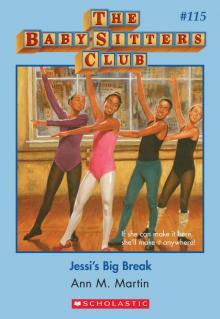 Jessi's Big Break
Jessi's Big Break Karen's Pony
Karen's Pony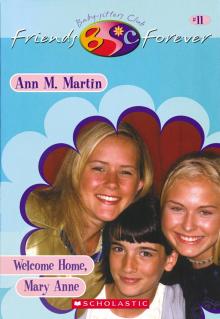 Welcome Home, Mary Anne
Welcome Home, Mary Anne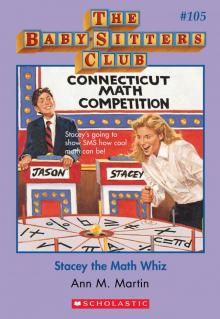 Stacey the Math Whiz
Stacey the Math Whiz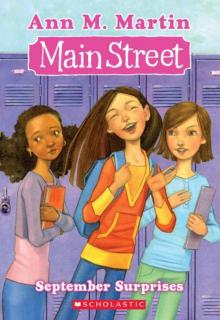 September Surprises
September Surprises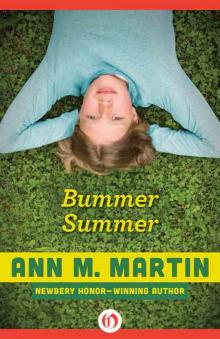 Bummer Summer
Bummer Summer Karen's Secret
Karen's Secret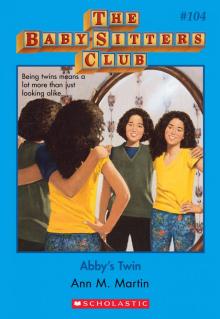 Abby's Twin
Abby's Twin Main Street #4: Best Friends
Main Street #4: Best Friends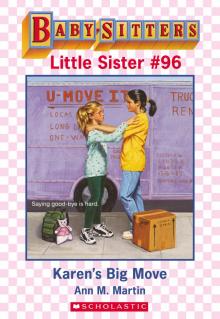 Karen's Big Move
Karen's Big Move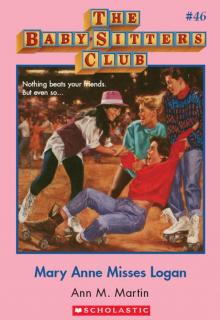 Mary Anne Misses Logan
Mary Anne Misses Logan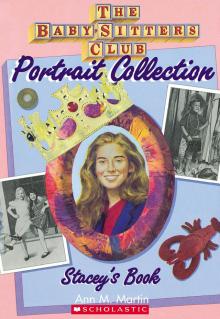 Stacey's Book
Stacey's Book Claudia and the Perfect Boy
Claudia and the Perfect Boy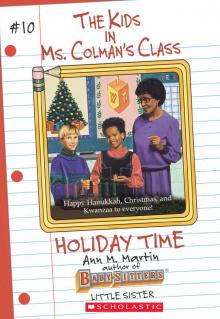 Holiday Time
Holiday Time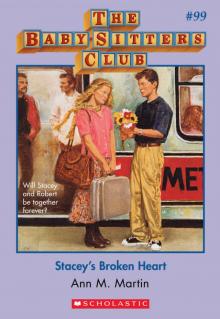 Stacey's Broken Heart
Stacey's Broken Heart Karen's Field Day
Karen's Field Day Kristy's Worst Idea
Kristy's Worst Idea Dawn and the Older Boy
Dawn and the Older Boy Karen's Brothers
Karen's Brothers Claudia's Friend
Claudia's Friend Mary Anne and the Haunted Bookstore
Mary Anne and the Haunted Bookstore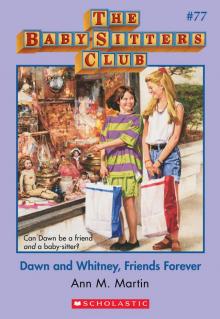 Dawn and Whitney, Friends Forever
Dawn and Whitney, Friends Forever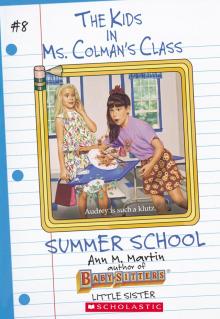 Summer School
Summer School Karen's Birthday
Karen's Birthday Karen's Black Cat
Karen's Black Cat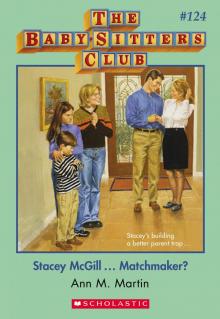 Stacey McGill... Matchmaker?
Stacey McGill... Matchmaker?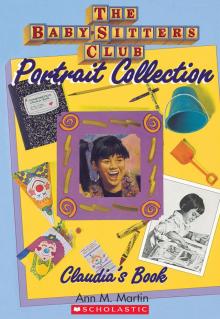 Claudia's Book
Claudia's Book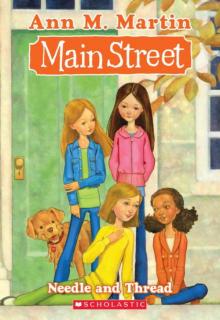 Main Street #2: Needle and Thread
Main Street #2: Needle and Thread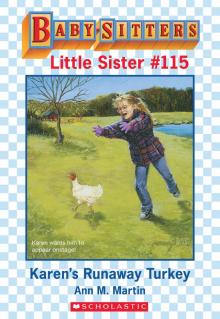 Karen's Runaway Turkey
Karen's Runaway Turkey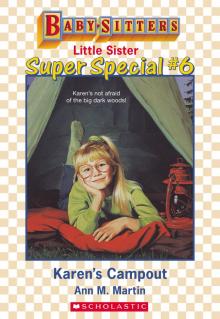 Karen's Campout
Karen's Campout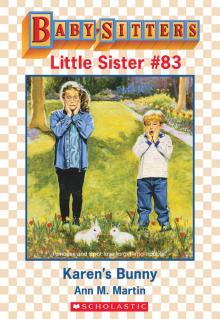 Karen's Bunny
Karen's Bunny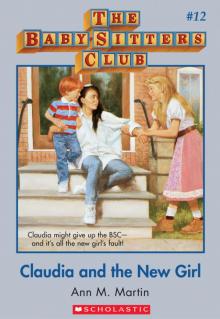 Claudia and the New Girl
Claudia and the New Girl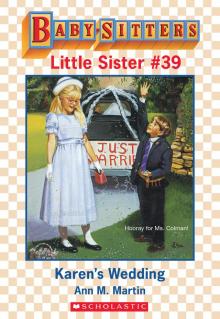 Karen's Wedding
Karen's Wedding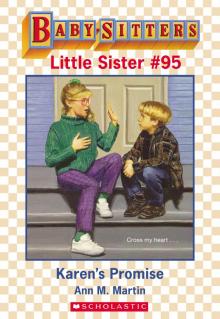 Karen's Promise
Karen's Promise Karen's Snow Princess
Karen's Snow Princess Claudia Kishi, Middle School Dropout
Claudia Kishi, Middle School Dropout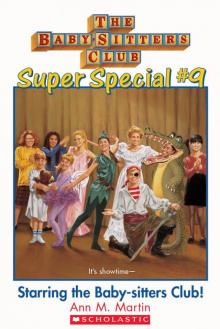 Starring the Baby-Sitters Club!
Starring the Baby-Sitters Club!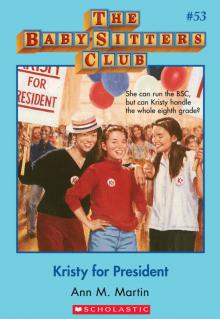 Kristy for President
Kristy for President California Girls!
California Girls!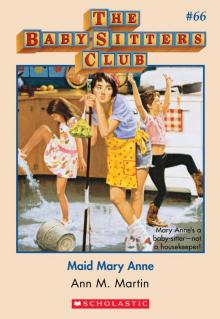 Maid Mary Anne
Maid Mary Anne Abby's Un-Valentine
Abby's Un-Valentine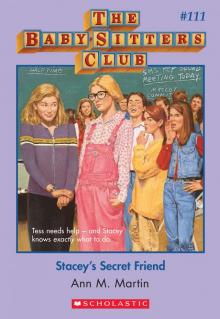 Stacey's Secret Friend
Stacey's Secret Friend Karen's Haunted House
Karen's Haunted House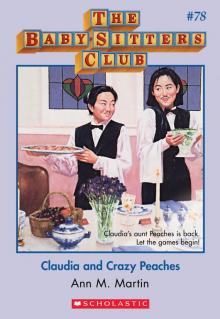 Claudia and Crazy Peaches
Claudia and Crazy Peaches Karen's Prize
Karen's Prize Get Well Soon, Mallory!
Get Well Soon, Mallory! Karen's Doll Hospital
Karen's Doll Hospital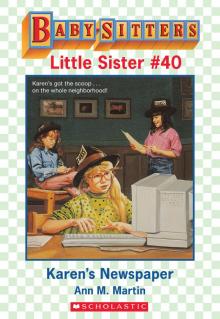 Karen's Newspaper
Karen's Newspaper Karen's Toothache
Karen's Toothache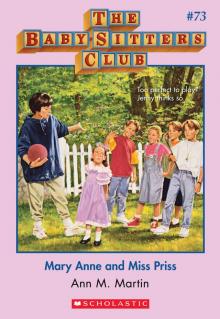 Mary Anne and Miss Priss
Mary Anne and Miss Priss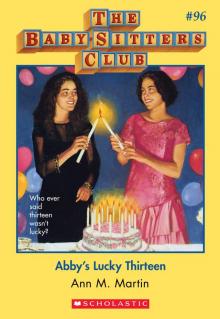 Abby's Lucky Thirteen
Abby's Lucky Thirteen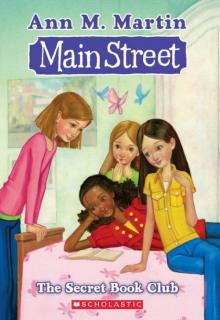 The Secret Book Club
The Secret Book Club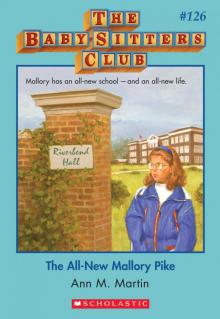 The All-New Mallory Pike
The All-New Mallory Pike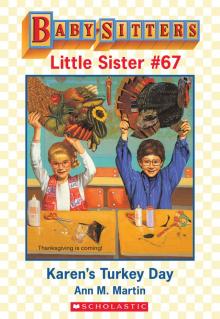 Karen's Turkey Day
Karen's Turkey Day Karen's Magician
Karen's Magician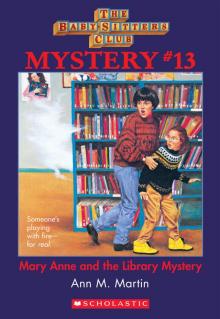 Mary Anne and the Library Mystery
Mary Anne and the Library Mystery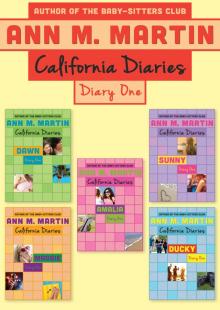 Diary One: Dawn, Sunny, Maggie, Amalia, and Ducky
Diary One: Dawn, Sunny, Maggie, Amalia, and Ducky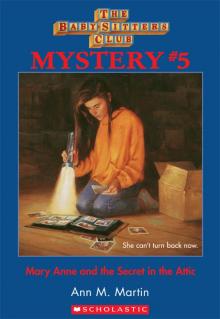 Mary Anne and the Secret in the Attic
Mary Anne and the Secret in the Attic Kristy and the Mother's Day Surprise
Kristy and the Mother's Day Surprise Karen's in Love
Karen's in Love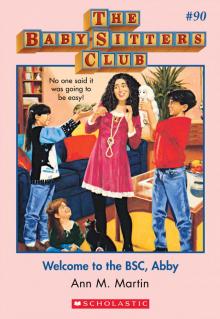 Welcome to the BSC, Abby
Welcome to the BSC, Abby Karen's Kittycat Club
Karen's Kittycat Club The Mystery at Claudia's House
The Mystery at Claudia's House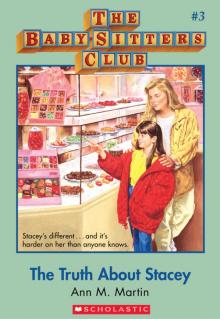 The Truth About Stacey
The Truth About Stacey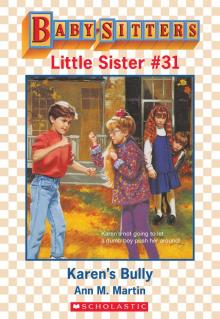 Karen's Bully
Karen's Bully Karen's Gift
Karen's Gift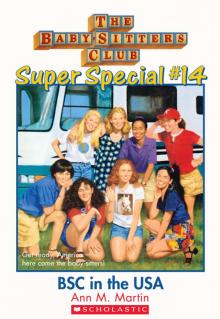 BSC in the USA
BSC in the USA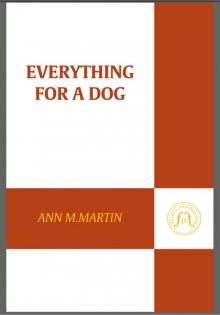 Everything for a Dog
Everything for a Dog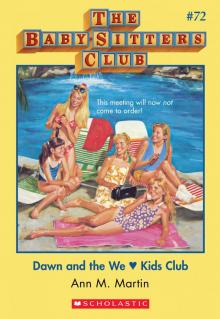 Dawn and the We Love Kids Club
Dawn and the We Love Kids Club Karen's Ghost
Karen's Ghost Stacey's Lie
Stacey's Lie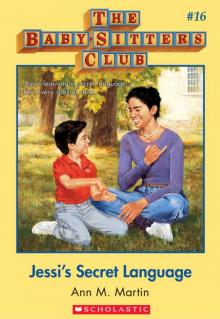 Jessi's Secret Language
Jessi's Secret Language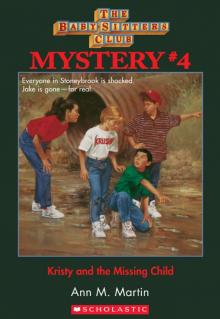 Kristy and the Missing Child
Kristy and the Missing Child Better to Wish
Better to Wish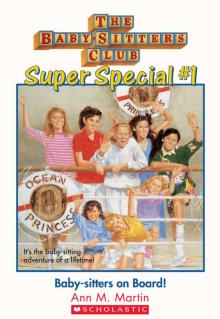 Baby-Sitters on Board!
Baby-Sitters on Board!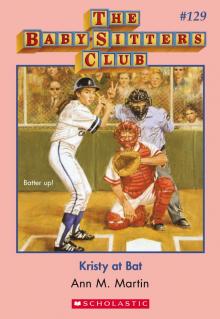 Kristy at Bat
Kristy at Bat Everything Changes
Everything Changes Don't Give Up, Mallory
Don't Give Up, Mallory A Dog's Life: The Autobiography of a Stray
A Dog's Life: The Autobiography of a Stray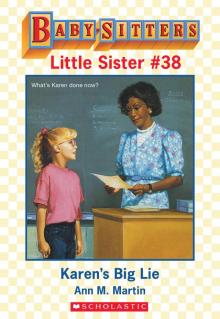 Karen's Big Lie
Karen's Big Lie Karen's Show and Share
Karen's Show and Share Mallory Hates Boys (and Gym)
Mallory Hates Boys (and Gym)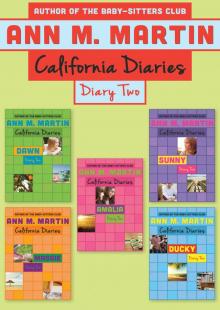 Diary Two: Dawn, Sunny, Maggie, Amalia, and Ducky
Diary Two: Dawn, Sunny, Maggie, Amalia, and Ducky Karen's Pen Pal
Karen's Pen Pal Claudia and the Friendship Feud
Claudia and the Friendship Feud Karen's Secret Valentine
Karen's Secret Valentine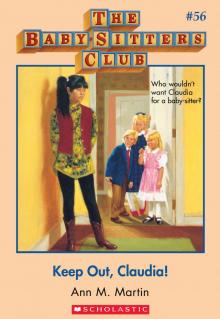 Keep Out, Claudia!
Keep Out, Claudia! Aloha, Baby-Sitters!
Aloha, Baby-Sitters! Welcome Back, Stacey
Welcome Back, Stacey Jessi Ramsey, Pet-Sitter
Jessi Ramsey, Pet-Sitter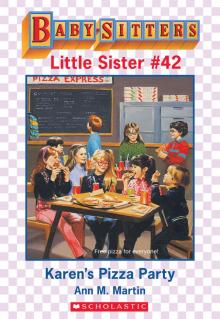 Karen's Pizza Party
Karen's Pizza Party Kristy and the Dirty Diapers
Kristy and the Dirty Diapers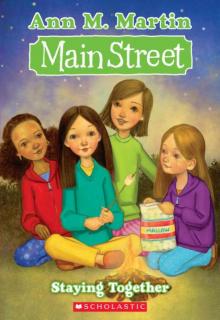 Staying Together
Staying Together Dawn and the Surfer Ghost
Dawn and the Surfer Ghost Claudia Makes Up Her Mind
Claudia Makes Up Her Mind Jessi's Gold Medal
Jessi's Gold Medal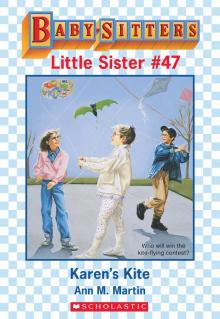 Karen's Kite
Karen's Kite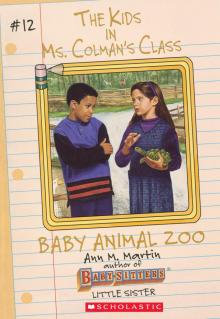 Baby Animal Zoo
Baby Animal Zoo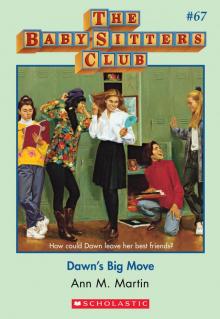 Dawn's Big Move
Dawn's Big Move Karen's Big Joke
Karen's Big Joke Karen's Lemonade Stand
Karen's Lemonade Stand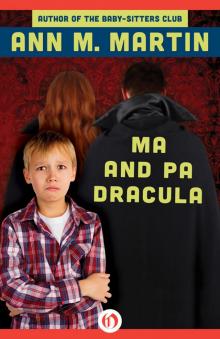 Ma and Pa Dracula
Ma and Pa Dracula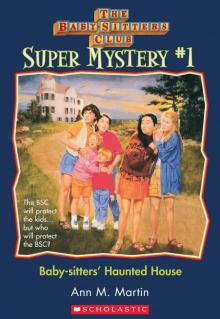 Baby-Sitters' Haunted House
Baby-Sitters' Haunted House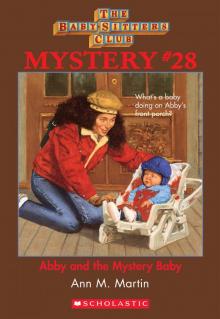 Abby and the Mystery Baby
Abby and the Mystery Baby Home Is the Place
Home Is the Place Karen's Grandad
Karen's Grandad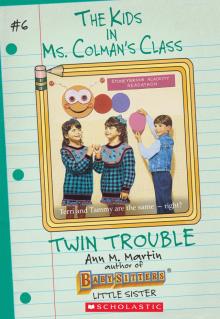 Twin Trouble
Twin Trouble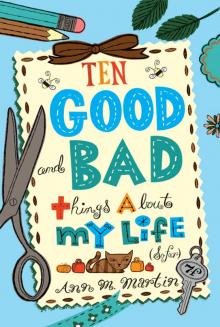 Ten Good and Bad Things About My Life (So Far)
Ten Good and Bad Things About My Life (So Far)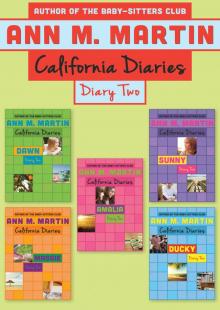 Diary Two
Diary Two Baby-Sitters Club 027
Baby-Sitters Club 027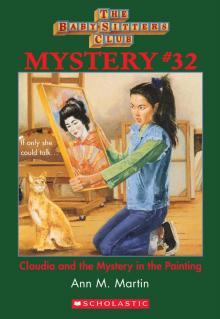 Claudia and the Mystery Painting
Claudia and the Mystery Painting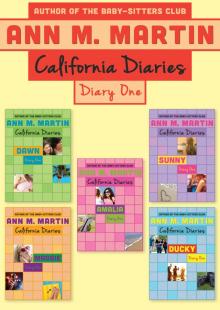 Diary One
Diary One Baby-Sitters Club 037
Baby-Sitters Club 037 Baby-Sitters Club 028
Baby-Sitters Club 028 Baby-Sitters Club 085
Baby-Sitters Club 085 Dawn Schaffer Undercover Baby-Sitter
Dawn Schaffer Undercover Baby-Sitter Jessi's Babysitter
Jessi's Babysitter The Baby-Sitters Club #110: Abby the Bad Sport (Baby-Sitters Club, The)
The Baby-Sitters Club #110: Abby the Bad Sport (Baby-Sitters Club, The) Karen's Little Sister
Karen's Little Sister Baby-Sitters Club 058
Baby-Sitters Club 058 Claudia And The Genius On Elm St.
Claudia And The Genius On Elm St. Missy Piggle-Wiggle and the Sticky-Fingers Cure
Missy Piggle-Wiggle and the Sticky-Fingers Cure Kristy and Kidnapper
Kristy and Kidnapper Baby-Sitters Club 041
Baby-Sitters Club 041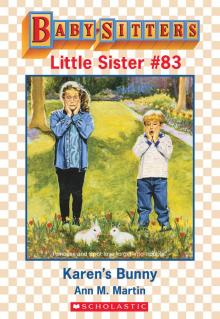 Karen's Bunny Trouble
Karen's Bunny Trouble Baby-Sitters Club 032
Baby-Sitters Club 032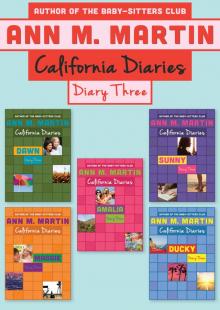 Diary Three
Diary Three Christmas Chiller
Christmas Chiller Karen's Half-Birthday
Karen's Half-Birthday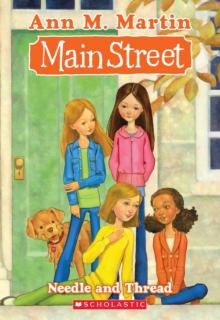 Needle and Thread
Needle and Thread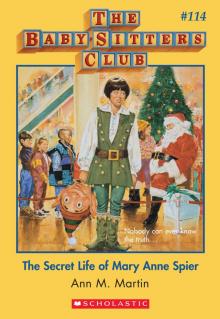 Secret Life of Mary Anne Spier
Secret Life of Mary Anne Spier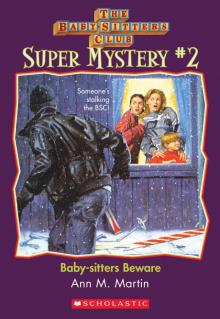 Baby-Sitters Beware
Baby-Sitters Beware Claudia Kishi, Middle School Drop-Out
Claudia Kishi, Middle School Drop-Out Logan Likes Mary Anne !
Logan Likes Mary Anne ! Baby-Sitters Club 061
Baby-Sitters Club 061 Best Friends
Best Friends Baby-Sitters Club 031
Baby-Sitters Club 031 Karen's Little Witch
Karen's Little Witch Jessi Ramsey, Petsitter
Jessi Ramsey, Petsitter Baby-Sitters Club 123
Baby-Sitters Club 123 Baby-Sitters Club 059
Baby-Sitters Club 059 Baby-Sitters Club 033
Baby-Sitters Club 033 Baby-Sitters Club 060
Baby-Sitters Club 060 Baby-Sitters Club 094
Baby-Sitters Club 094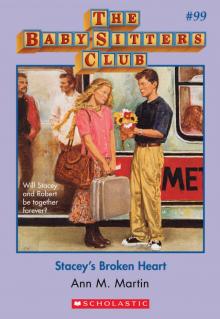 The Baby-Sitters Club #99: Stacey's Broken Heart
The Baby-Sitters Club #99: Stacey's Broken Heart The Baby-Sitters Club #109: Mary Anne to the Rescue (Baby-Sitters Club, The)
The Baby-Sitters Club #109: Mary Anne to the Rescue (Baby-Sitters Club, The) Mystery At Claudia's House
Mystery At Claudia's House Claudia And The Sad Goodbye
Claudia And The Sad Goodbye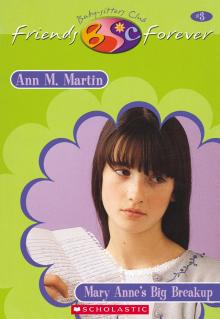 Mary Anne's Big Break-Up
Mary Anne's Big Break-Up Baby-Sitters Club 025
Baby-Sitters Club 025 Baby-Sitters Club 042
Baby-Sitters Club 042 Stacey and the Mystery of the Empty House
Stacey and the Mystery of the Empty House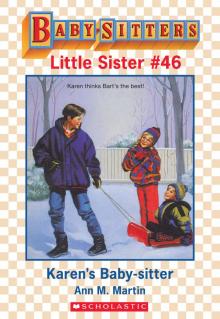 Karen's Baby-Sitter
Karen's Baby-Sitter Claudia's Friendship Feud
Claudia's Friendship Feud Baby-Sitters Club 090
Baby-Sitters Club 090 Baby-Sitters Club 021
Baby-Sitters Club 021 Baby-Sitters Club 056
Baby-Sitters Club 056 Baby-Sitters Club 040
Baby-Sitters Club 040 The Baby-Sitters Club #108: Don't Give Up, Mallory (Baby-Sitters Club, The)
The Baby-Sitters Club #108: Don't Give Up, Mallory (Baby-Sitters Club, The)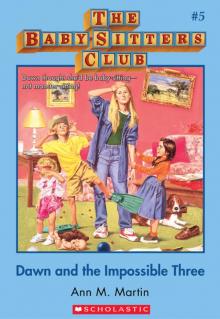 Dawn and the Impossible Three
Dawn and the Impossible Three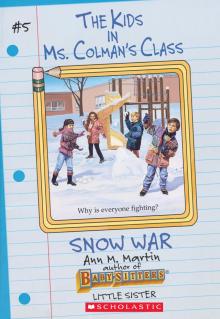 The Snow War
The Snow War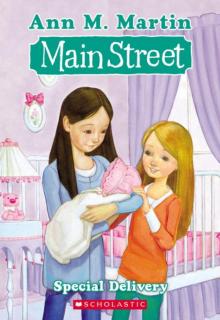 Special Delivery
Special Delivery Baby-Sitters Club 057
Baby-Sitters Club 057 Mary Anne And Too Many Babies
Mary Anne And Too Many Babies Baby-Sitters Club 030
Baby-Sitters Club 030